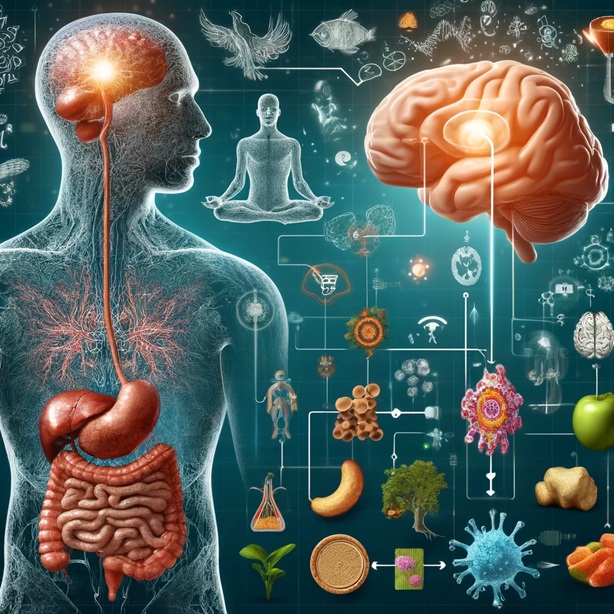Brain Health and the Gut Microbiome: Unveiling the Connection

Introduction to the Gut-Brain Axis
The gut-brain axis represents a vital communication network that connects the enteric nervous system of the gastrointestinal tract with the central nervous system. This bi-directional pathway involves various hormonal, immune, and neuronal communication routes that regulate a wide range of bodily functions, including several cognitive processes and emotional health. The relationship between what we consume and how our brain functions illustrates the profound impact our diet has on our mental capabilities.
Recent research has highlighted the gut-brain axis as a crucial factor in maintaining cognitive health and emotional well-being, emphasizing the need to consider gut health as a component of overall mental health. Through this axis, the gut and brain communicate continuously, influencing each other’s functions and impacting our mood, behavior, and cognitive performance.
Impact of Gut Microbiome on Cognitive Function
Recent advancements in medical research have emphasized the significant role that the gut microbiome plays in overall brain health, influencing functions from memory and decision-making to emotional responses. The gut microbiome consists of trillions of microorganisms that produce metabolites and neurochemicals, impacting brain function and behavior. An imbalance in the gut’s microbial environment, or dysbiosis, has been linked to numerous neurological and psychological disorders, such as depression, anxiety, and neurodegenerative diseases like Alzheimer’s and Parkinson’s.
Studies have shown that gut bacteria can influence brain function through various mechanisms, including the production of neurotransmitters, modulation of the immune system, and regulation of the gut barrier. These mechanisms highlight the importance of maintaining a healthy gut microbiome for cognitive function and mental well-being.
Understanding Microbial Influences
The complex ecosystem of microbes residing in the gut produces numerous neurochemicals, which the brain utilizes to regulate various mental processes, including learning, memory, and mood. For example, a significant portion of the body’s serotonin, crucial for mood regulation, is synthesized by gut bacteria. Additionally, gut bacteria produce gamma-aminobutyric acid (GABA), dopamine, and other neurotransmitters that influence cognitive function and emotional health.
These microbial influences extend to the immune system, as the gut-associated lymphoid tissue plays a key role in immune function and inflammation, which are closely linked to brain health. By interacting with the immune system, gut bacteria can influence neuroinflammation, neurogenesis, and neuroplasticity, impacting cognitive function and mental well-being.
Strategies to Enhance Gut Health for Improved Brain Function
Optimizing gut health can significantly enhance brain function. This can be achieved through various means, such as maintaining a balanced diet rich in fiber, probiotics, and prebiotics to support a healthy gut microbiome. Probiotic foods, such as yogurt, kefir, and fermented vegetables, introduce beneficial bacteria to the gut, while prebiotic foods, such as garlic, onions, and bananas, provide nourishment for these bacteria. Consuming a diverse and nutrient-dense diet supports a diverse and healthy gut microbiome, which in turn supports cognitive health and emotional well-being.
Engaging in regular physical activity and effectively managing stress through mindfulness, meditation, or yoga can also promote the growth of beneficial gut bacteria, which supports mental health. Exercise has been shown to enhance gut microbiome diversity and reduce gut permeability, while stress management techniques reduce stress-induced changes in gut bacteria and gut-brain communication.
Other strategies for enhancing gut health include staying hydrated, avoiding excessive alcohol consumption, and limiting the use of antibiotics, which can disrupt the gut microbiome. By adopting these strategies, individuals can support their gut health and promote cognitive function and mental well-being.
Current Research and Future Directions
The exploration of the gut-brain axis continues to be a rich field of study, with researchers delving deeper into how gut health affects neurodegeneration and mental health disorders. The potential for new treatment modalities, such as probiotics and prebiotics specifically targeting the gut microbiome, offers promising avenues for alleviating symptoms of brain disorders. Additionally, emerging research is exploring the use of fecal microbiota transplantation, personalized nutrition, and psychobiotics as potential therapies for gut-brain axis-related conditions.
Current research is also investigating the role of the gut-brain axis in various cognitive functions, such as learning, memory, and decision-making, as well as its impact on mood and behavior. By understanding the complex interactions between the gut and brain, researchers aim to develop novel interventions for cognitive health and emotional well-being, highlighting the importance of gut health in overall mental health.
Conclusion
The intricate connections between the gut microbiome and brain health offer exciting new insights into how we can treat and prevent cognitive decline and enhance mental well-being. As research in this area progresses, the potential for innovative therapeutic strategies becomes increasingly apparent, underscoring the critical role of maintaining gut health for overall brain functionality and emotional stability. By optimizing gut health through diet, lifestyle, and targeted interventions, individuals can enhance their cognitive function, mental health, and quality of life.